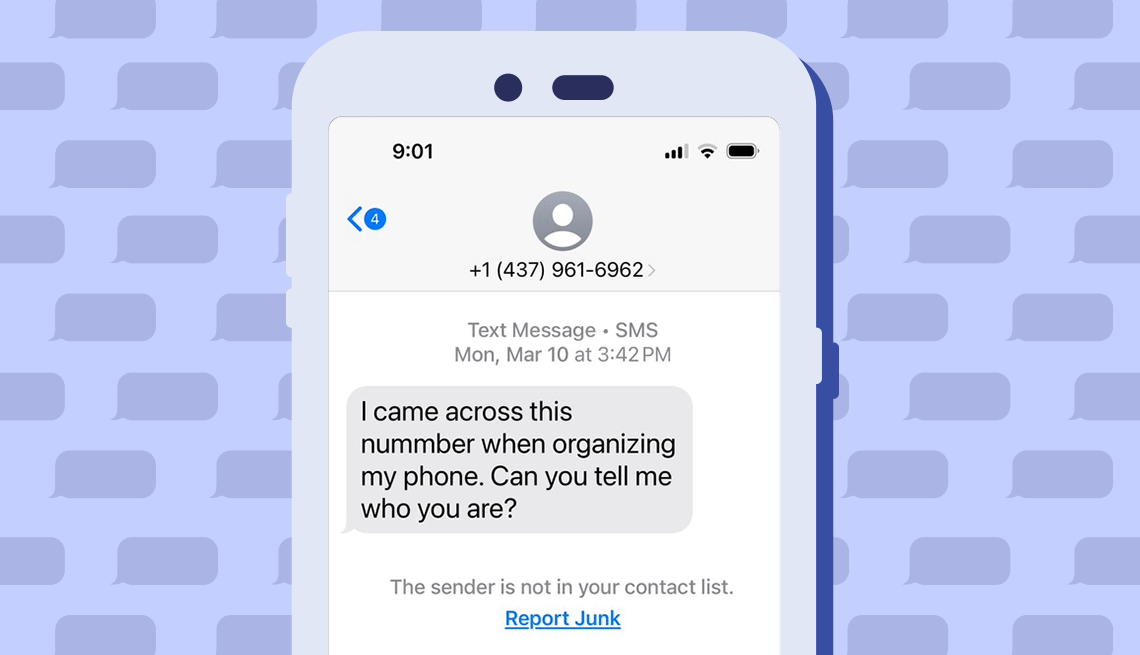AARP Hearing Center


If you own a mobile phone, it’s likely that you’ve received a mysterious text from someone who acts as if they know you. But even though you quickly figure out that the person isn’t a real acquaintance, out of politeness — or curiosity — you might end up interacting with them anyway.
“You’ll get a text message that says, ‘Hey, you coming for dinner tonight?’” says Amy Nofziger, director of victim support for the AARP Fraud Watch Network. “And you’re like, ‘Oh, I’m sorry, I think you have the wrong number.’ And they’re like, ‘Oh, OK, I’m so sorry to bother you. But I hope you’re having a great day.’ And then you just start an innocent conversation.”
That’s what perpetrators of fake wrong-number text message scams are counting on. Once they’ve made a connection with an unwary target, they’ll work to become friends with that person, or sometimes even cultivate a remote romantic relationship, embellished with fake photos. It’s all a ruse, designed to get you to relax your defenses so that you’ll be susceptible to a scam, such as a cryptocurrency investment scheme.
Americans already are inundated with unwanted text messages, many of them sent by the automated apps known as bots. Security software company Robokiller reports that 19.2 billion spam texts were sent in April 2025 — an average of nearly 63 for each person in the U.S. While it’s unclear how many of those are wrong-number texts, consumer advocates warn that crooks increasingly are turning to the ruse.
How fake wrong-number text scams work
“Scammers are aware that the quickest means of communicating with a victim is by text message, so their efforts naturally follow the societal shift to SMS messaging,” says Josh Planos, a Better Business Bureau spokesperson.
Nofziger once received a text from someone who seemed to be trying to reach a veterinarian to make an urgent appointment for a sick dog. When she responded out of concern, she says, the scammer quickly transitioned to talking about crypto. She’s also received an “Oops, wrong number!” text from a likely scammer pretending to be a woman attempting to contact her yoga instructor.
They may say, “How are you? Have I missed your call?” or even just, “Hello.” Some have telltale misspellings or grammar mistakes (an AARP reporter recently received, “Hello, how are you been? Are you working today?”),
Such scams often succeed, because criminals are skilled at exploiting their targets’ friendliness. “You would be surprised at how many people who get a wrong number text are amenable to trying to help the person who they think has dialed a wrong number,” says Erin West, a deputy district attorney in Santa Clara County, California, who has organized a coalition of law enforcement officials to combat crypto-related scams.
But what seems like an innocent mistake by the sender actually is the first move in a long con, according to West. Once the scammer gets a person to respond, more messages usually follow. “It goes on over a period of weeks, or even a month, where this scammer will develop a relationship,” she says. “It could be a romantic relationship, or a friendship, or a mentor relationship with the victim.”






































































More From AARP
Are You a Scam Victim? You Might Get Hit Again — by Taxes
Advocates are working to change federal laws to separate fraud losses from taxable incomeDrivers: Keep an Eye Out for New Toll Road Scams
Criminals pretend to be highway officials requesting payment after your tripHow to Keep a Loved One With Cognitive Decline Safe From Scams
Key steps to protect vulnerable family members’ finances in an age of rampant fraudRecommended for You